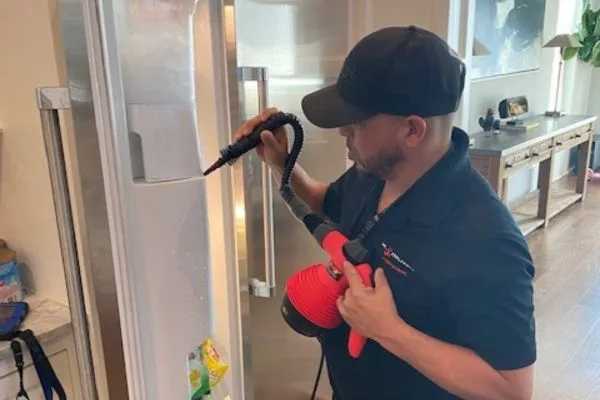Learn to Handle It Like a Pro: Solutions For a Refrigerator Leaking

As convenient, magical, and revolutionary as appliances are, every appliance owner knows that at some point in time, the appliance will let you down. Its expiry date will come, and a new and improved appliance will take its place. But in order to off-put that replacement date, knowing how to fix your refrigerator leaking should be able to do that. Puddles of water are fun to splash in when you're in rubber boots outside. Water puddling around your refrigerator can lead to water damage on your kitchen floor and leave your socks wet and uncomfortable.
A leaking fridge should never be ignored, as it can lead to costly repairs for both your floor and beyond. However, the good news is that diagnosing the issue is a simple task if you know where to begin. The solution can be as straightforward as leveling the refrigerator or unclogging blocked lines, provided you know how to access them. To effectively address a refrigerator leaking, it's essential to understand the common causes that can lead to this problem. Mr. Appliance of Greater Atlanta has prepared a handy guide on resolving your refrigerator leaking. With our expert's nine easy troubleshooting tips, you can fix the leak as if you were one of our appliance repair specialists. And if you still can't conquer the leaking fridge by the end of the blog, don't worry—our reliable Atlanta appliance repair specialists are just a phone call away, ready to solve the problem for you!
9 Simple Steps To Fix a Leaking Refrigerator
A busy kitchen is the heart of a family, but when your refrigerator starts leaking water and stops working, it can wreak havoc on your daily routine. The issue of food spoilage is a significant cause for concern, particularly given the substantial amount of money that is invested in grocery shopping. So, regardless of your refrigerator model, let's take a look at the common issues that lead to a refrigerator leaking.
1. Inspect The Water Supply Line
The main reason behind a refrigerator leaking is often attributed to a defective water supply line or faulty inlet valves. Therefore, it is highly recommended to prioritize examining the supply line as your initial step. Check your water supply line if you notice poor ice making or a poor water flow with your water dispenser. Pause now and disconnect the refrigerator to locate a safe storage place for perishable items. Move the fridge away from the walls and examine the plastic hose connecting the ice maker and water filter.
Should water be dripping from the hose, it needs to be replaced, as it's the cause of the water leak. If you decide to handle the repair yourself, remember to shut off the water supply before replacing the hose.
2. Is Your Refrigerator Level?
Another simple solution for a refrigerator leaking is to check the levelness of your fridge. If the refrigerator is not level, it can lead to water spilling out of the drain pan. If you have recently cleaned behind your fridge and shifted its position, it's highly likely that these actions have caused the leaking fridge. For better performance, it is important that refrigerators are not perfectly level. Instead, the front should be elevated between a quarter-inch and half-inch higher than the back.
This slight tilt facilitates the free flow of coolant, the liquid responsible for maintaining the fridge's cold temperature. When coolant is unable to circulate effectively, it can accumulate in the pipes, causing the refrigerator to exert unnecessary effort to pump it. This added strain results in increased condensation around the coils, potentially leading to water puddles on the floor that may appear as a fridge leak.
3. Check On The Defrost Drain
The defrost drain is typically located at the back of the freezer and can become obstructed if the freezer compartment is overstuffed. Excessive moisture in your fridge can occur due to the accumulation of food particles from frozen foods or ice, which may cause a blocked defrost drain, resulting in your refrigerator leaking. When you have a defrost drain blockage, the coils will work harder and can lead to excess condensation. The condensation dribbles to the floor and will form a puddle. To correct this, you will have to rearrange your freezer, so there is no chance of a clogged defrost drain. Then, using a turkey baster, drop warm water through the drain to clear out any clogs.
4. Compromised Drain Pan
The purpose of the drain pan is to gather condensation and excess water that accumulates during the refrigeration process. Normally, the water in the pan will naturally evaporate. However, if the pan is damaged, it can result in water leakage all over the place. When the drain pan is compromised, the condensate water may escape through a hole or crack, causing it to drip inside or onto your kitchen floors. In such cases, the drain pan needs to be replaced.
Fortunately, you can easily find a new drain pan for your refrigerator at a local hardware store. Just make sure to consult your appliance manual for proper replacement instructions and to determine the specific type of drain pan required for your fridge model.
5. The Water Inlet Valve
If you suspect the inlet valve at the back of your fridge is causing issues with the ice maker, you can perform a simple test. First, turn off the water at the shutoff valve (saddle valve), usually located under the fridge, and disconnect the supply tube. Hold the tube over a bucket and have someone turn on the saddle valve. If water flows from the tube, it's likely the inlet valve is the problem. To replace the inlet valve, remove the cover panel, unscrew the screws holding the valve in place, unplug the wiring, and disconnect the water lines. Then, simply reverse the steps to install the new valve.
6. Check On The Built-In Ice Maker
If you have a built-in ice maker, your refrigerator might be prone to leaking for various reasons.
In order to prevent leaks, it's important to check for potential clogs in the inlet tube of the ice dispenser. To do this, make sure to unplug your appliance before removing the ice maker. Once the wiring harness is unplugged, carefully examine it for any ice cube remnants that may be causing the clog. If you find any, use a hairdryer to gently melt the trapped ice, allowing the water to drain from the tube. Once the clog is cleared, reassemble all the components.
Your refrigerator leaking might be related to the water inlet valve supplying water to the ice maker. By turning off the water at the saddle valve and disconnecting the supply tube, you can test for water flow. If there is a leak, the tube will need to be replaced. An appliance repair specialist can accurately diagnose and solve any water leak issues with the inlet valve or tube.
7. The Evaporator Fan Motor
A malfunctioning evaporator fan motor can hinder a freezer from reaching the required cold temperature, potentially leading to your refrigerator leaking. Typically situated in the freezer, this fan motor is susceptible to blockages from debris or dust buildup, which in turn can lead to condensation on the coils and water dripping onto the floor. Thoroughly cleaning these coils with a long brush can prevent such issues. Additionally, checking and replacing the fan motor if necessary will help ensure proper airflow and prevent further damage to the freezer. It's important to regularly maintain and inspect the evaporator fan motor to avoid any potential issues. You may need an appliance professional to help with this replacement.
8. Inspect Your Door Seals
The seals on your refrigerator door are essential for maintaining a proper temperature in your freezer, which is crucial for preserving your food and preventing spoilage. Additionally, these seals play a key role in minimizing energy use by ensuring the refrigerator operates efficiently. If your seals are worn out or damaged, it can lead to increased energy consumption and put extra strain on your unit. Therefore, it's imperative to regularly inspect your fridge for any signs of seal damage.
When warm air and cold air meet, condensation occurs. This can result in excessive condensation, leading to ice buildup inside your freezer. If your freezer struggles to maintain temperature, it might lead to melting, causing your refrigerator to leak water all over the floor. It's effective if you clean your door seals with some dish soap, hot water, and a towel. However, if there is quite a bit of wear and tear like cracks or peeling in sections, schedule a service to have them replaced.
9. Humidity Levels
The last step we have listed doesn't apply to the appliance itself. But if you have high humidity in your home, it can cause issues with your fridge or freezer.
If there is too much moisture in the air, it can cause excessive condensation inside your appliances, leading to mold, a malfunctioning cooling system, or even your refrigerator leaking. To solve this issue, you may need to regulate the humidity levels in your home using a dehumidifier or enhancing ventilation.
If You Can't Control Your Refrigerator Leaking, Call Mr. Appliance of Greater Atlanta!
We have identified common reasons for your refrigerator leaking, but there may be underlying and unknown issues as well. Having an appliance professional come for a second opinion and professional eye may solve a problem you didn't know existed. The seasoned appliance specialists at Mr. Appliance of Greater Atlanta possess extensive knowledge in handling typical refrigerator leaks. Your valuable investment is well taken care of, giving you complete peace of mind.
As a locally owned and operated company, we have deep knowledge of the Atlanta community and its unique needs. When your refrigerator starts leaking, you can rely on us to provide top-notch refrigerator repair, maintenance, and upkeep services. With our expert attention to every detail of the job, we ensure that your appliance receives the best care possible. Our core values of respect, integrity, and customer focus guide everything we do. When you choose us, you are selecting a home appliance repair company that you can wholeheartedly trust!
Do you have a leaking fridge? Before deciding on a complete replacement, contact our customer service team to arrange a repair for your leaky refrigerator!
 Click to call
Click to call


